-
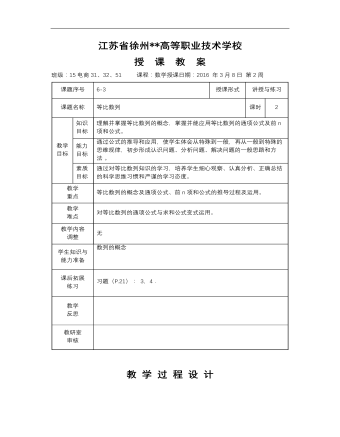
高教版中职数学基础模块下册:6.3《等比数列》教学设计
课题序号6-3授课形式讲授与练习课题名称等比数列课时2教学 目标知识 目标理解并掌握等比数列的概念,掌握并能应用等比数列的通项公式及前n项和公式。能力 目标通过公式的推导和应用,使学生体会从特殊到一般,再从一般到特殊的思维规律,初步形成认识问题、分析问题、解决问题的一般思路和方法 。素质 目标通过对等比数列知识的学习,培养学生细心观察、认真分析、正确总结的科学思维习惯和严谨的学习态度。教学 重点等比数列的概念及通项公式、前n项和公式的推导过程及运用。教学 难点对等比数列的通项公式与求和公式变式运用。教学内容 调整无学生知识与 能力准备数列的概念课后拓展 练习 习题(P.21): 3,4.教学 反思 教研室 审核
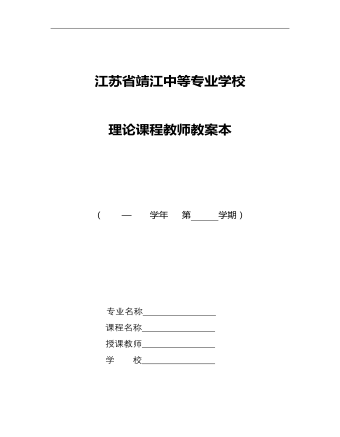
高教版中职数学基础模块下册:9.5《柱、锥、球及其简单组合体》教学设计
课题序号 授课班级 授课课时2授课形式 教学方法 授课章节 名称9.5柱、锥、球及其组合体使用教具 教学目的1、使学生认识柱、锥、球及其组合体的结构特征,并能运用这些特征描述生活中简单物体的结构。 2、让学生了解柱、锥、球的侧面积和体积的计算公式。 3、培养学生观察能力、计算能力。
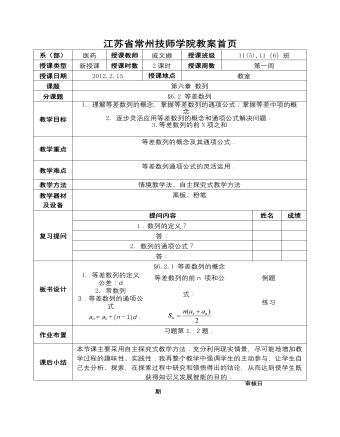
高教版中职数学基础模块下册:6.2《等差数列》教学设计
系(部)医药授课教师戚文撷授课班级11(5),11(6)班授课类型新授课授课时数2课时授课周数第一周授课日期2012.2.15授课地点 教室课题第六章数列分课题§6.2 等差数列教学目标1. 理解等差数列的概念,掌握等差数列的通项公式;掌握等差中项的概念. 2. 逐步灵活应用等差数列的概念和通项公式解决问题. 3.等差数列的前N项之和 . 4.培养学生分析、比较、归纳的逻辑思维能力. . 2. 3.教学重点等差数列的概念及其通项公式. 教学难点等差数列通项公式的灵活运用. 教学方法情境教学法、自主探究式教学方法教学器材及设备黑板、粉笔复习提问提问内容姓名成绩1.数列的定义? 答: 2. 数列的通项公式? 答: 板书设计 §6.2.1等差数列的概念 1. 1.等差数列的定义 公差:d 2.常数列 3.等差数列的通项公式 an=a1+(n-1)d. 等差数列的前n 项和公式: 例题 练习作业布置习题第1,2题.课后小结本节课主要采用自主探究式教学方法.充分利用现实情景,尽可能地增加教学过程的趣味性、实践性.我再整个教学中强调学生的主动参与,让学生自己去分析、探索,在探索过程中研究和领悟得出的结论,从而达到使学生既获得知识又发展智能的目的.
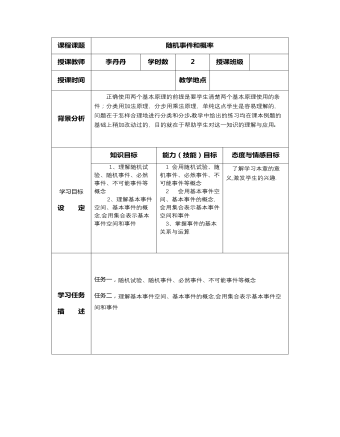
高教版中职数学基础模块下册:10.2《概率》教学设计
课程课题随机事件和概率授课教师李丹丹学时数2授课班级 授课时间 教学地点 背景分析正确使用两个基本原理的前提是要学生清楚两个基本原理使用的条件;分类用加法原理,分步用乘法原理,单纯这点学生是容易理解的,问题在于怎样合理地进行分类和分步教学中给出的练习均在课本例题的基础上稍加改动过的,目的就在于帮助学生对这一知识的理解与应用 学习目标 设 定知识目标能力(技能)目标态度与情感目标1、理解随机试验、随机事件、必然事件、不可能事件等概念 2、理解基本事件空间、基本事件的概念,会用集合表示基本事件空间和事件 1 会用随机试验、随机事件、必然事件、不可能事件等概念 2 会用基本事件空间、基本事件的概念,会用集合表示基本事件空间和事件 3、掌握事件的基本关系与运算 了解学习本章的意义,激发学生的兴趣. 学习任务 描 述 任务一,随机试验、随机事件、必然事件、不可能事件等概念 任务二,理解基本事件空间、基本事件的概念,会用集合表示基本事件空间和事件
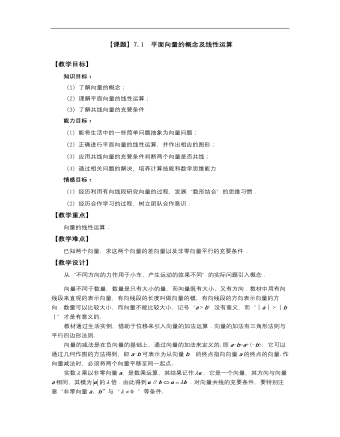
高教版中职数学基础模块下册:7.1《平面向量的概念及线性运算》教学设计
教 学 过 程教师 行为学生 行为教学 意图时间 *揭示课题 7.1 平面向量的概念及线性运算 *创设情境 兴趣导入 如图7-1所示,用100N①的力,按照不同的方向拉一辆车,效果一样吗? 图7-1 介绍 播放 课件 引导 分析 了解 观看 课件 思考 自我 分析 从实例出发使学生自然的走向知识点 0 3*动脑思考 探索新知 【新知识】 在数学与物理学中,有两种量.只有大小,没有方向的量叫做数量(标量),例如质量、时间、温度、面积、密度等.既有大小,又有方向的量叫做向量(矢量),例如力、速度、位移等. 我们经常用箭头来表示方向,带有方向的线段叫做有向线段.通常使用有向线段来表示向量.线段箭头的指向表示向量的方向,线段的长度表示向量的大小.如图7-2所示,有向线段的起点叫做平面向量的起点,有向线段的终点叫做平面向量的终点.以A为起点,B为终点的向量记作.也可以使用小写英文字母,印刷用黑体表示,记作a;手写时应在字母上面加箭头,记作. 图7-2 平面内的有向线段表示的向量称为平面向量. 向量的大小叫做向量的模.向量a, 的模依次记作,. 模为零的向量叫做零向量.记作0,零向量的方向是不确定的. 模为1的向量叫做单位向量. 总结 归纳 仔细 分析 讲解 关键 词语 思考 理解 记忆 带领 学生 分析 引导 式启 发学 生得 出结 果 10
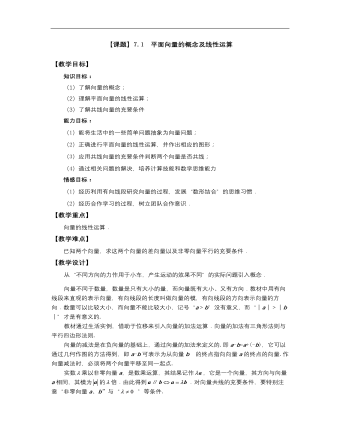
高教版中职数学基础模块下册:7.1《平面向量的概念及线性运算》教学设计
教 学 过 程教师 行为学生 行为教学 意图时间 *揭示课题 7.1 平面向量的概念及线性运算 *创设情境 兴趣导入 如图7-1所示,用100N①的力,按照不同的方向拉一辆车,效果一样吗? 图7-1 介绍 播放 课件 引导 分析 了解 观看 课件 思考 自我 分析 从实例出发使学生自然的走向知识点 0 3*动脑思考 探索新知 【新知识】 在数学与物理学中,有两种量.只有大小,没有方向的量叫做数量(标量),例如质量、时间、温度、面积、密度等.既有大小,又有方向的量叫做向量(矢量),例如力、速度、位移等. 我们经常用箭头来表示方向,带有方向的线段叫做有向线段.通常使用有向线段来表示向量.线段箭头的指向表示向量的方向,线段的长度表示向量的大小.如图7-2所示,有向线段的起点叫做平面向量的起点,有向线段的终点叫做平面向量的终点.以A为起点,B为终点的向量记作.也可以使用小写英文字母,印刷用黑体表示,记作a;手写时应在字母上面加箭头,记作. 图7-2 平面内的有向线段表示的向量称为平面向量. 向量的大小叫做向量的模.向量a, 的模依次记作,. 模为零的向量叫做零向量.记作0,零向量的方向是不确定的. 模为1的向量叫做单位向量. 总结 归纳 仔细 分析 讲解 关键 词语 思考 理解 记忆 带领 学生 分析 引导 式启 发学 生得 出结 果 10
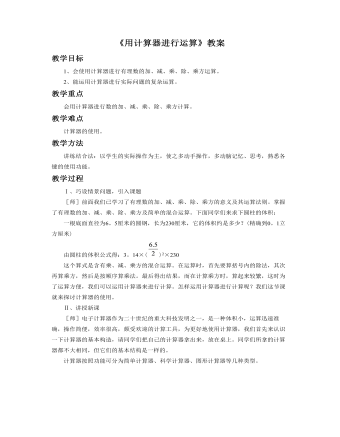
利用计算器进行有理数的计算教案教学设计
计算器的面板是由键盘和显示器组成的。显示器是用来显示输入的数据和计算结果的装置。显示器因计算器的种类不同而不同,有单行显示的,也有双行显示的。在键盘的每个键上,都标明了这个键的功能。我们看键盘上标有的键,是开机键,在开始使用计算器时先要按一下这个键,以接通电源,计算器的电源一般用5号电池或钮扣电池。再看键,是关机键,停止使用计算器时要按一下这个键,来切断计算器的电源,是清除键,按一下这个键,计算器就清除当前显示的数与符号。的功能是完成运算或执行命令。是运算键,按一下这个键,计算器就执行加法运算。
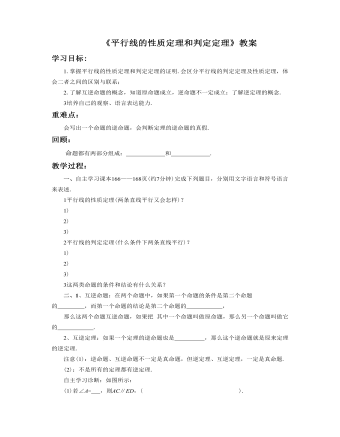
平行线的性质定理和判定定理教案教学设计
1、互逆命题:在两个命题中,如果第一个命题的条件是第二个命题的 ,而第一个命题的结论是第二个命题的 ,那么这两个命题互逆命题,如果把其中一个命题叫做原命题,那么另一个命题叫做它的 .2、互逆定理:如果一个定理的逆命题也是 ,那么这个逆命题就是原来定理的逆定理.注意(1):逆命题、互逆命题不一定是真命题,但逆定理、互逆定理,一定是真命题.(2):不是所有的定理都有逆定理.自主学习诊断:如图所示:(1)若∠A= ,则AC∥ED,( ).(2)若∠EDB= ,则AC∥ED,( ).(3)若∠A+ =1800,则AB∥FD,( ).(4)若∠A+ =1800,则AC∥ED,( ).
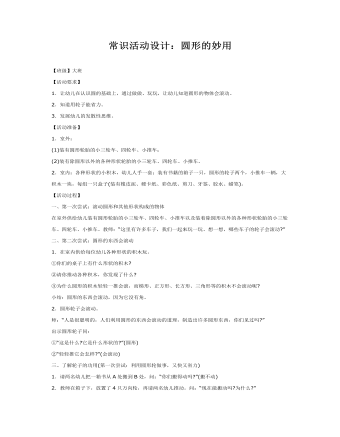
大班科学教案:常识活动设计:圆形的妙用
1.让幼儿在认识圆的基础上,通过做做、玩玩,让幼儿知道圆形的物体会滚动。2.知道用轮子能省力。3.发展幼儿的发散性思维。【活动准备】1.室外:(1)装有圆形轮胎的小三轮车、四轮车、小推车;(2)装有除圆形以外的各种形状轮胎的小三轮车、四轮车、小推车。2.室内:各种形状的小积木,幼儿人手一套;装有书籍的箱子一只,圆形的轮子两个,小推车一辆,大积木一块,每组一只盒子(装有橡皮泥、硬卡纸、彩色纸、剪刀、牙签、胶水、蜡笔)。【活动过程】一、第一次尝试:滚动圆形和其他形状构成的物体在室外供给幼儿装有圆形轮胎的小三轮车、四轮车、小推车以及装着除圆形以外的各种形状轮胎的小三轮车、四轮车、小推车。教师:“这里有许多车子,我们一起来玩一玩、想一想,哪些车子的轮子会滚动?”二、第二次尝试:圆形的东西会滚动1.在室内供给每位幼儿各种形状的积木玩。①你们的桌子上有什么形状的积木?②请你推动各种积木,你发现了什么?③为什么圆形的积木轻轻一推会滚,而梯形、正方形、长方形、三角形等的积木不会滚动呢?小结:圆形的东西会滚动,因为它没有角。
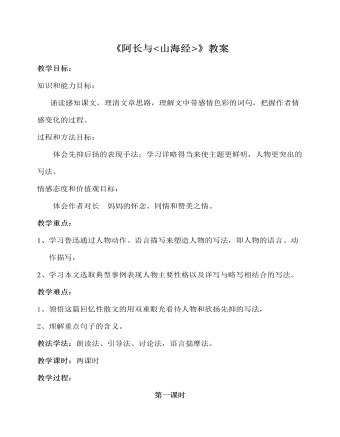
部编版语文七年级下册《阿长与山海经》教案
教学目标: 知识和能力目标:诵读感知课文,理清文章思路,理解文中带感情色彩的词句,把握作者情感变化的过程。 过程和方法目标:体会先抑后扬的表现手法;学习详略得当来使主题更鲜明,人物更突出的写法。 情感态度和价值观目标:体会作者对长 妈妈的怀念、同情和赞美之情。教学重点:1、 学习鲁迅通过人物动作、语言描写来塑造人物的写法,即人物的语言、动作描写,2、 学习本文选取典型事例表现人物主要性格以及详写与略写相结合的写法。教学难点:1、 领悟这篇回忆性散文的用双重眼光看待人物和欲扬先抑的写法,2、 理解重点句子的含义。教法学法:朗读法、引导法、讨论法,语言揣摩法。教学课时:两课时 教学过程:第一课时一、导入在鲁迅先生的散文《从百草园到三味书屋》里,鲁迅除写了自己的老师寿镜吾先生之外,还写到了一个人,这个人是谁呢?
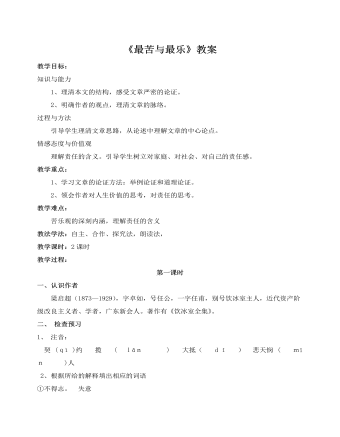
部编版语文七年级下册《最苦与最乐》教案
② 什么事最快乐呢?(用原文语句回答)责任完了,算是人生第一件乐事。③用文中语句概括第4自然段的内容。天下事从苦中得来的乐才算真乐。④请从最后一段中找出与“快乐之权,操之在己”内涵相符的一句:尽得大的责任,就得大快乐;尽得小的责任,就得小快乐。第二课时四、师生探究讨论第一部分:1、文章开头设问“人生什么事最苦?”提到了哪些事,它们是最苦的事吗?贫→知足;失意→安分;老、死→达观。作者认为它们可以从心态上、观念上去排解。2、接着作者提出自己的见解,人生什么事最苦呢? (请用原文回答)我说人生最苦的事,莫若身上背着一种未了的责任。3、作者举了哪些例子证明自己的观点?从个人对他人的责任(承诺未完、欠人钱、受人恩惠、得罪人等)再延伸到对家庭、社会、国家,乃至于对自己都有责任,一旦应尽的责任没有尽,这种痛苦无法解脱。
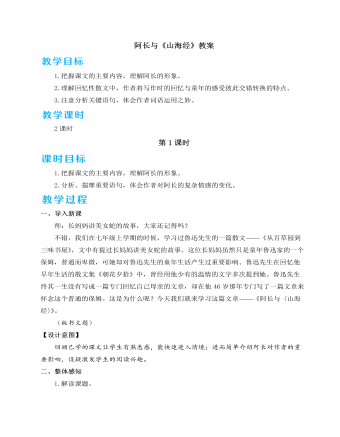
人教部编版七年级下册阿长与《山海经》教案
四、总结存储1.教师总结。纵观作者对阿长形象的刻画,犹如一部连续剧。从“喜欢切切察察”,对“我”过分看管,到睡相粗俗;从“懂得许多规矩”,特别是“元旦的古怪仪式”,到给“我”讲长毛的故事,再到“谋害”隐鼠,多侧面多角度地展现出阿长的个性特点:粗俗好事,迷信无知,却又乐天安命,简单率性。直到阿长给“我”买来《山海经》,先抑后扬的表达效果才充分显现,阿长纯朴善良、仁厚慈爱的品格在前文的衬托下显得格外闪光。而文章末尾,作者饱含深情地祝祷,将全文情感推向高潮。2.课外练笔。在你的童年生活中,有没有像阿长这样给你留下深刻印象的普通人?你怎样看待他们的优缺点?谈一谈你的想法和感受。(200字左右)【设计意图】在学生对课文有了整体的认知之后,教师总结提升。然后要求学生发现生活中普通人的闪光点,发现人性美,并进行课外练笔,有利于学生在实践中巩固技能,以读促写,读写结合,不仅可以加深对课文内容的理解,还能锻炼学生的写作能力。
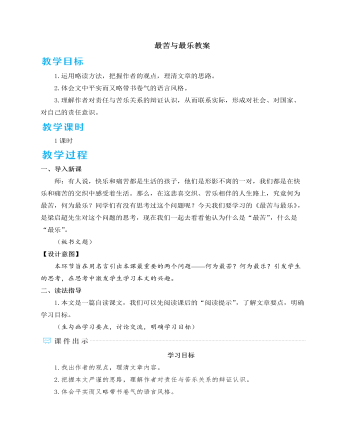
人教部编版七年级下册最苦与最乐教案
梁启超(1873—1929),字卓如,号任公,别号饮冰室主人。广东新会人,思想家、学者。清朝光绪年间举人,戊戌变法(百日维新)领袖之一、中国近代维新派、新法家代表人物。幼年受传统教育,光绪十年(1884)中秀才,1889年中举。后从师于康有为,成为资产阶级改良派的宣传家。维新变法前,协助康有为一起联合在京应试举人发动“公车上书”运动,此后先后领导北京和上海的强学会,又与黄遵宪一起办《时务报》,任长沙时务学堂的总教习,并著《变法通议》为变法做宣传。戊戌变法失败后,逃亡日本。晚年任清华国学研究院导师。他一生著述颇丰,著有《清代学术概论》《中国近三百年学术史》等,著作大多收入《饮冰室合集》。文学知识议论文议论文是一种以议论为主要表达方式,通过摆事实、讲道理,直接表达作者的观点和主张的常用文体。论点、论据和论证,是议论文的三要素。

初中化学人教版九年级上册《实验活动3燃烧的条件》教案
【学习目标】1.知识与技能:加深对燃烧条件的认识,进一步了解灭火的原理。2.过程与方法:体验实验探究的过程,学习利用实验探究的方法研究化学。3.情感态度与价值观:利用化学知识解释实际生活中的具体问题,使学生充分体会到化学来源于生活,服务于社会。【学习重点】通过物质燃烧条件的探究,学习利用控制变量的思想设计探究实验,说明探究实验的一般过程和方法。【学习难点】利用控制变量的思想设计对照实验进行物质燃烧条件的探究。【课前准备】《精英新课堂》:预习学生用书的“早预习先起步”。《名师测控》:预习赠送的《提分宝典》。情景导入 生成问题1.复习:什么叫燃烧?燃烧条件有哪些?今天自己设计实验来进行探究。2.明确实验目标,导入新课。合作探究 生成能力学生阅读课本P150的相关内容并掌握以下内容。实验用品:镊子、烧杯、坩埚钳、三脚架、薄铜片、酒精、棉花、乒乓球、滤纸、蜡烛。你还需要的实验用品:酒精灯、水。1.实验:用棉花分别蘸酒精和水,放到酒精灯火焰上加热片刻。上述实验中我们能观察到什么现象?说明燃烧需要什么条件?如果在酒精灯上加热时间较长,会发生什么现象?答:蘸酒精的棉花燃烧,蘸水的棉花没有燃烧,说明燃烧需要有可燃物。如果加热时间较长,水蒸发后,蘸水的棉花也会燃烧。2.如图所示,进行实验:我们能观察到什么现象?说明燃烧需要什么条件?答:在酒精灯火焰上加热乒乓球碎片和滤纸碎片,都能燃烧,说明二者都是可燃物。放在铜片两侧给它们加热后可看到乒乓球碎片先燃烧,说明燃烧需要温度达到可燃物的着火点。3.你能利用蜡烛和烧杯(或选择其他用品)设计一个简单实验证明燃烧需要氧气(或空气)吗?答:点燃两支相同的蜡烛,然后在一支蜡烛上扣住一只杯子,看到被杯子扣住的蜡烛一会儿就熄灭,说明燃烧的条件之一是需要氧气。
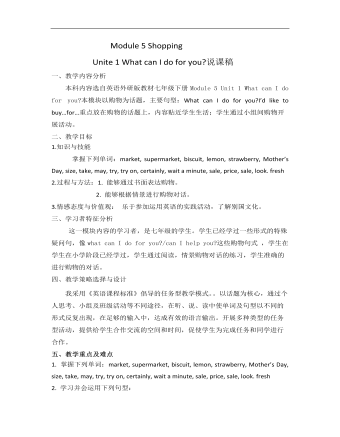
初中英语外研版七年级下册《Module 5 Shopping》说课稿
二、教学目标1.知识与技能掌握下列单词:market, supermarket,biscuit, lemon, strawberry, Mother’s Day, size, take, may, try, try on,certainly, wait a minute, sale, price, sale, look. fresh2.过程与方法:1. 能够通过书面表达购物。2. 能够根据情景进行购物对话。3.情感态度与价值观:乐于参加运用英语的实践活动,了解别国文化。
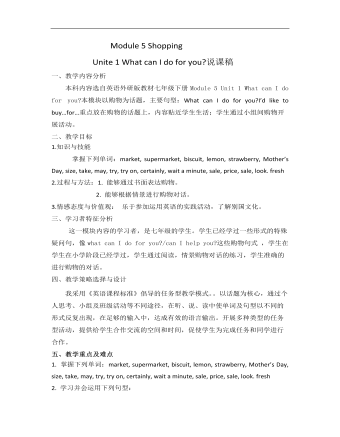
初中英语外研版七年级下册《Module 5 Shopping》说课稿
二、教学目标1.知识与技能掌握下列单词:market, supermarket,biscuit, lemon, strawberry, Mother’s Day, size, take, may, try, try on,certainly, wait a minute, sale, price, sale, look. fresh2.过程与方法:1. 能够通过书面表达购物。2. 能够根据情景进行购物对话。3.情感态度与价值观:乐于参加运用英语的实践活动,了解别国文化。三、学习者特征分析这一模块内容的学习者,是七年级的学生。学生已经学过一些形式的特殊疑问句,像what can I do for you?/can I help you?这些购物句式 ,学生在学生在小学阶段已经学过,学生通过阅读,情景购物对话的练习,学生准确的进行购物的对话。
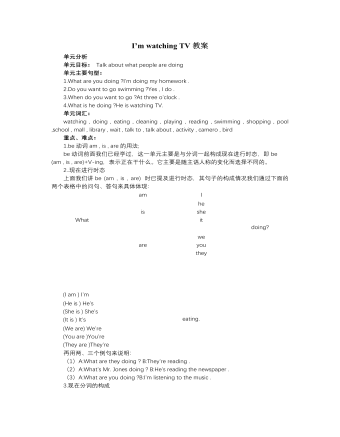
人教版新目标初中英语七年级下册I’m watching TV教案
单元分析单元目标: Talk about what people are doing 单元主要句型:1.What are you doing ?I’m doing my homework .2.Do you want to go swimming ?Yes , I do .3.When do you want to go ?At three o’clock .4.What is he doing ?He is watching TV. 单元词汇:watching , doing , eating , cleaning , playing , reading , swimming , shopping , pool ,school , mall , library , wait , talk to , talk about , activity , camero , bird 重点、难点:1.be动词am , is , are的用法;be动词前面我们已经学过,这一单元主要是与分词一起构成现在进行时态,即be (am , is , are)+V-ing,表示正在干什么。它主要是随主语人称的变化而选择不同的。2..现在进行时态上面我们讲be (am , is , are) 时已提及进行时态,其句子的构成情况我们通过下面的两个表格中的问句、答句来具体体现:3.现在分词的构成现在进行时态中be + V - ing 的构成中V-ing被称为现在分词,它的基本构成是动词原形+ing,但也有些特殊情况,下面分几类说明:(1)一般情况+ing如:read→reading,go→going,do→doing,look→looking,listen→listening,watch→watching.(2)以不发音的e结尾的词,去掉e,再加ing.如:write→writing,skate→skating,type→typing,wake→waking,make→making
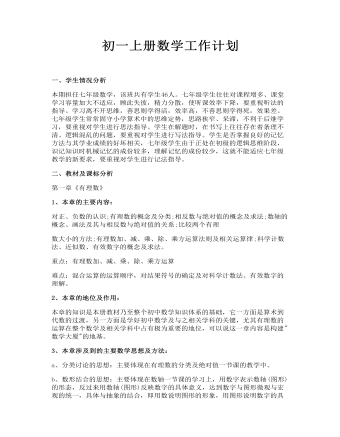
初一上册数学工作计划
第一章《有理数》1、本章的主要内容:对正、负数的认识;有理数的概念及分类;相反数与绝对值的概念及求法;数轴的概念、画法及其与相反数与绝对值的关系;比较两个有理数大小的方法;有理数加、减、乘、除、乘方运算法则及相关运算律;科学计数法、近似数、有效数字的概念及求法。重点:有理数加、减、乘、除、乘方运算难点:混合运算的运算顺序,对结果符号的确定及对科学计数法、有效数字的理解。
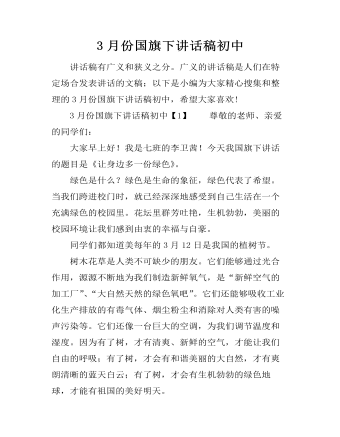
3月份国旗下讲话稿初中
讲话稿有广义和狭义之分。广义的讲话稿是人们在特定场合发表讲话的文稿;以下是小编为大家精心搜集和整理的3月份国旗下讲话稿初中,希望大家喜欢!3月份国旗下讲话稿初中【1】 尊敬的老师、亲爱的同学们:大家早上好!我是七班的李卫茜!今天我国旗下讲话的题目是《让身边多一份绿色》。绿色是什么?绿色是生命的象征,绿色代表了希望。当我们跨进校门时,就已经深深地感受到自己生活在一个充满绿色的校园里。花坛里群芳吐艳,生机勃勃,美丽的校园环境让我们感到由衷的幸福与自豪。同学们都知道美每年的3月12日是我国的植树节。树木花草是人类不可缺少的朋友。它们能够通过光合作用,源源不断地为我们制造新鲜氧气,是“新鲜空气的加工厂”、“大自然天然的绿色氧吧”。它们还能够吸收工业化生产排放的有毒气体、烟尘粉尘和消除对人类有害的噪声污染等。它们还像一台巨大的空调,为我们调节温度和湿度。因为有了树,才有清爽、新鲜的空气,才能让我们自由的呼吸;有了树,才会有和谐美丽的大自然,才有爽朗清晰的蓝天白云;有了树,才会有生机勃勃的绿色地球,才能有祖国的美好明天。
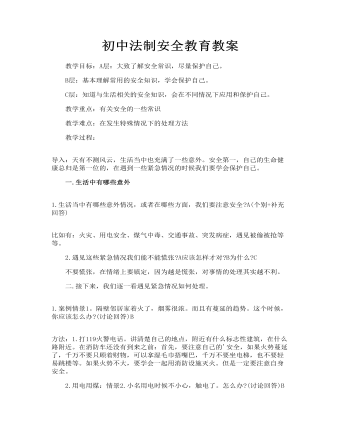
初中法制安全教育教案
一.生活中有哪些意外 1.生活当中有哪些意外情况,或者在哪些方面,我们要注意安全?A(个别+补充回答) 比如有:火灾、用电安全、煤气中毒、交通事故、突发病症,遇见被偷被抢等等。 2.遇见这些紧急情况我们能不能慌张?A应该怎样才对?B为什么?C 不要慌张,在情绪上要镇定,因为越是慌张,对事情的处理其实越不利。



